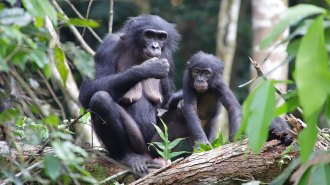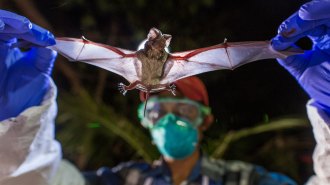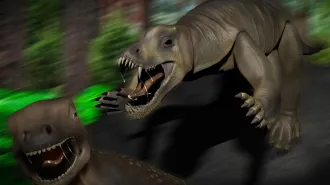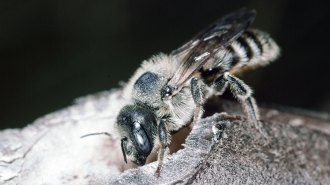Uncategorized
-
 Animals
AnimalsTwo bonobos adopted infants outside their group, marking a first for great apes
Female bonobos in a reserve in the Congo took care of orphaned infants — feeding, carrying and cuddling them — for at least one year.
-
 Health & Medicine
Health & MedicineWe still don’t know for sure where the coronavirus came from. Here’s why
A year into the pandemic, we know the virus probably came from bats, but how and why it leaped to humans are still unknown.
-
 Health & Medicine
Health & MedicineCoronavirus reinfections appear rare, especially in people younger than 65
Previous infections provide 80 percent protection in younger people and 47 percent in those over 65. Vaccines might help boost immunity further.
-
 Health & Medicine
Health & Medicine50 years ago, researchers treated chronic pain with electricity
In 1971, doctors eased chronic pain by sending electrical impulses to the spinal cord. Fifty years later, improved techniques help paralyzed people walk.
-
 Life
LifeTwo new books investigate why it’s so hard to define life
For centuries, scientists have struggled to define what it means to be alive. ‘What Is Life?’ and ‘Life’s Edge’ explore the question.
-
 Astronomy
AstronomyA gargantuan supernova remnant looks 40 times as big as the full moon
New observations confirm that a cloud in the constellation Antlia really is a supernova remnant and the largest ever seen from Earth.
By Ken Croswell -
 Earth
EarthPhosphorus for Earth’s earliest life may have been forged by lightning
Lightning strikes can supply one of life’s essential elements, long thought to be delivered by meteorites billions of years ago.
-
 Space
SpaceMost of Mars’ missing water may lurk in its crust
Computer simulations of the fate of Mars’ water may explain why the Red Planet turned into a desert, when so little of its water has escaped into space.
-
 Health & Medicine
Health & MedicineA deadly fungus behind hospital outbreaks was found in nature for the first time
Learning where the fungus Candida auris thrives in nature could help reveal why this yeast is dangerous to humans.
-
 Paleontology
PaleontologyAn ancient hippo-sized reptile may have been surprisingly agile
The skull of an Anteosaurus, a hefty reptile with a large snout, hints that it may have moved fast for its day.
-
 Animals
AnimalsBee larvae drum with their butts, which may confuse predatory wasps
Dual percussion instruments — one on the head, the other on the rear — give mason bee larvae a peculiar musical gift that may be a tool for survival.
By Jake Buehler -
 Health & Medicine
Health & MedicineThe latest Ebola outbreak may have started with someone infected years ago
Rather than stemming from a virus that jumped from an animal to a person, this outbreak might have originated from someone who had a dormant virus.